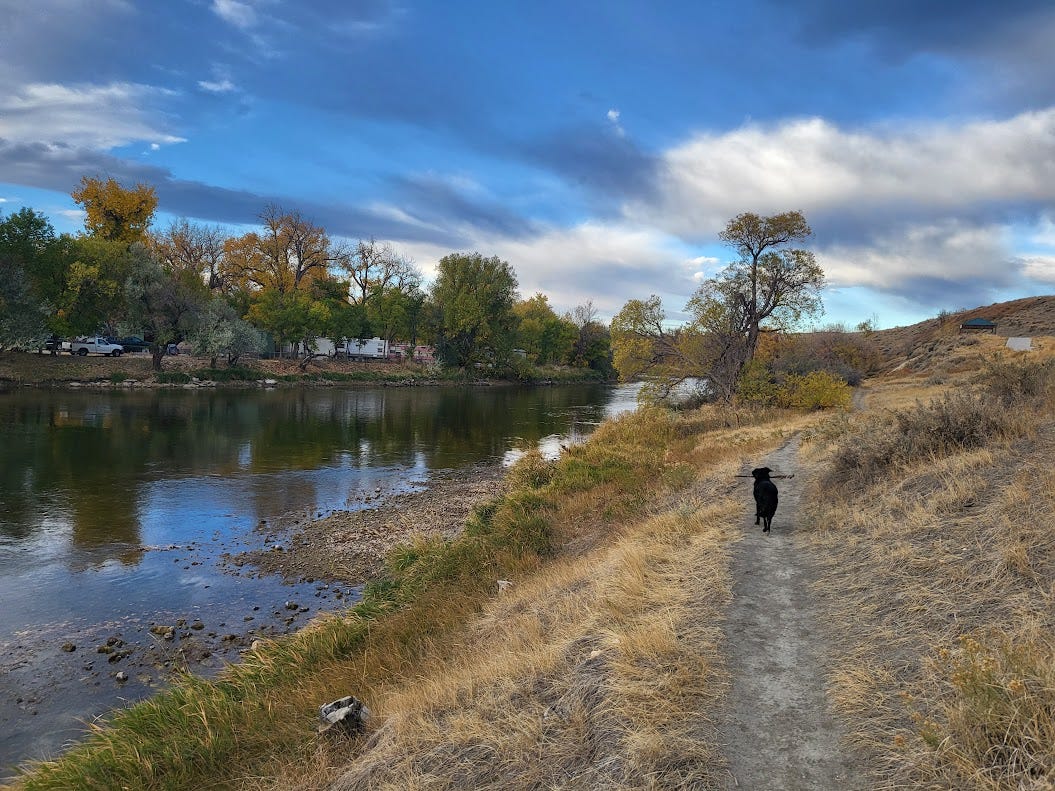From dread to delight
In a sequel to Nature's drift, how a Wyoming river changed my perspective
Last Saturday, I awoke in Casper, Wyoming, full of misery and dread. I was about to give a speech on public lands, for less money than I usually charge, in a city hardly known for embracing these ideas. Months ago, I had agreed to do it because I expected to be on my way home from a research trip to Denver. Then the Denver library closed for renovations and the trip got cancelled.
So I tried to imagine that I could use Casper as an excuse to go somewhere beautiful and fun. Then I caught some sort of flu or virus and spent my whole potentially-vacation week sick in bed. By Friday afternoon I’d recovered well enough to believe that I could drive the nearly five hours to Casper. But I hadn’t had the energy to call my one friend in Casper, or make a hotel reservation or dinner plans. On the drive, my phone died, so I then had to improvise my dinner and hotel choices the old-fashioned non-digital way.
It worked, but it exhausted me. I was short-tempered and full of self-pity. Worse, I felt myself approaching an emotional cliff. Going over the cliff would reactivate a sad archetype of chronic illness: that life is merely a series of obligations to trudge through. I was obliged to give the talk, thus obliged to drive to Casper and obliged to get a good night’s sleep. Then I’d be obliged to drive home.
The person who has gone over this cliff asks, How do you know you’re alive? and answers, Because you have bills to pay. This person hears voices commanding: Withdraw. Happiness comes from fewer obligations. My brain wanted to resist these voices. It saw falling off the cliff as lonely, self-destructive, and soul-destroying. But it knew that my body might not have the energy to choose differently.
Casper, with about 60,000 residents, is basically an oil town. People who love it cite a couple of museums and a pretty good bookstore. Tourism promoters highlight outdoor recreation at the unremarkable Casper Mountain and flyfishing on the North Platte River. But naysayers point out that the whole region is mostly flat and dry and unbelievably windy. Parts of Wyoming are romantically scenic; Casper epitomizes the other parts.
I’d done one thing right: my hotel abutted Casper’s Platte River Trail. So shortly after dawn and some awful hotel coffee, the dog and I set out for a walk on what turned out to be a delightful stretch of riverside. Soon I saw ducks. Then some geese and a gull. Then, to my great delight, a sandhill crane. No fish were jumping, but I wasn’t fishing. I didn’t see any mammals, but there were plenty of clouds lit pink by the sunrise. Blessedly, the wind had chosen this morning to sleep in.
I especially enjoyed watching the water. The North Platte here is broad but mostly shallow. It swished and swooshed back and forth across its wide bed. At one point, most of it channeled just below me, gurgling. At another point, it riffled across broad shoals, popping like droplets in hot oil.
I had just republished my essay “Nature's drift” and pondered my favorite sentence, a torrent of river-verbs: “gush, pour, drip, whoosh, meander, ooze, babble, gurgle, and burble.” I was glad to be here.
I was glad, too, to share. Across the river was a trailerpark. When I first saw it, I thought how trailerparks are always endangered by natural disasters such as floods—because they’re pushed to the risky marginal places by “higher uses” of land. But at least this one—clearly old and established, presumably full of stickers rather than boomers—took full advantage of its location.
Outdoor living spaces hugged the river-side of each trailer: lawn chairs, picnic tables, firepits. From some of these tiny backyards emerged paths down to the shore. Atop all of them loomed huge cottonwood trees, blazing in the October sunrise. At the right angle of light, I realized, the whole neighborhood would be bathed in gold.
Still exhausted from illness, my emotional body struggled to hold onto that optimism. An image arose: In some not-too-distant storm, winds would tear the limbs from these ancient cottonwoods and pitch them atop some pitiful trailers. I was tempted to run with the image and imagine the newspaper story profiling a newly-homeless family of victims. I was tempted to overthink the situation and ask if the story would call for legal reforms, even in libertarian Casper.
The river pulled me back. Water, trees, birds. Why should I waste my energy on fears of a future dystopia that might never happen? All the evidence in front of me said that I was looking at a Platonic Ideal of a trailerpark: where you come home tired and worn out from your poorly-paying job, and just wander a few yards down the river to rejuvenate. A moment worth celebrating.
So I did. I decided that I had not come to Casper out of obligation. I had come to the North Platte River to see it. Just to be near the water, I recalled writing. To treasure it.





Sorry to hear you were feeling so poorly. But sometimes adversity opens us to the delight of small things.
Casper is what it is and has to be appreciated for that. They can’t turn off the wind or elevate a modest mountain. They can’t rewrite an oily history. But they could and did give themselves and those who stop an excellent chance to commune with a river along which many stories flow. And one of those stories is that the people of Casper care enough to build and maintain the greenway. If any of them happen to read this, thank!
Beautiful, John.